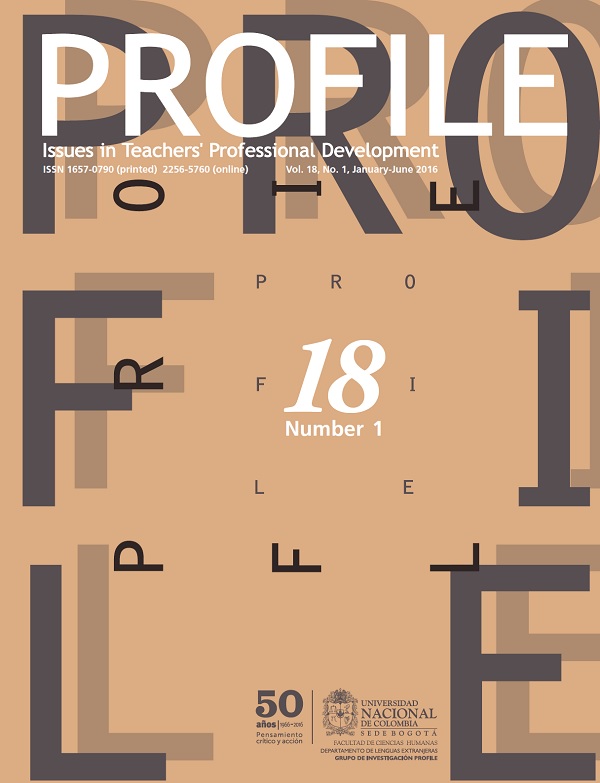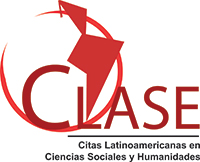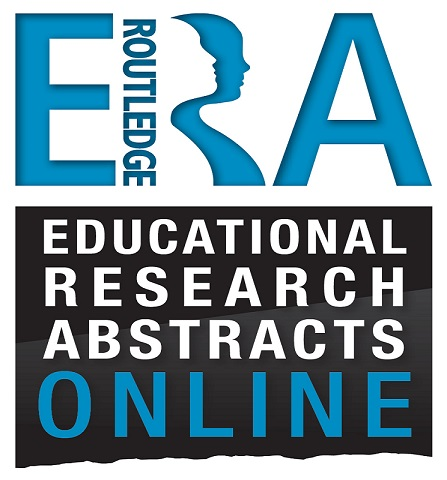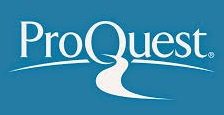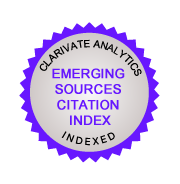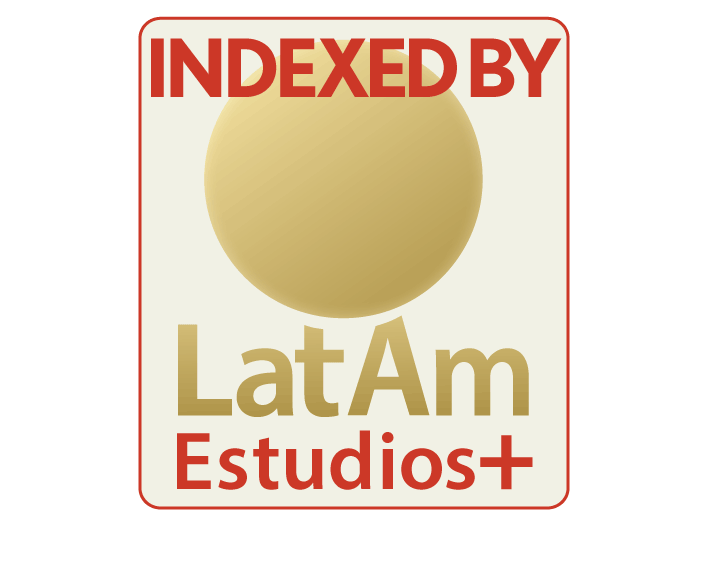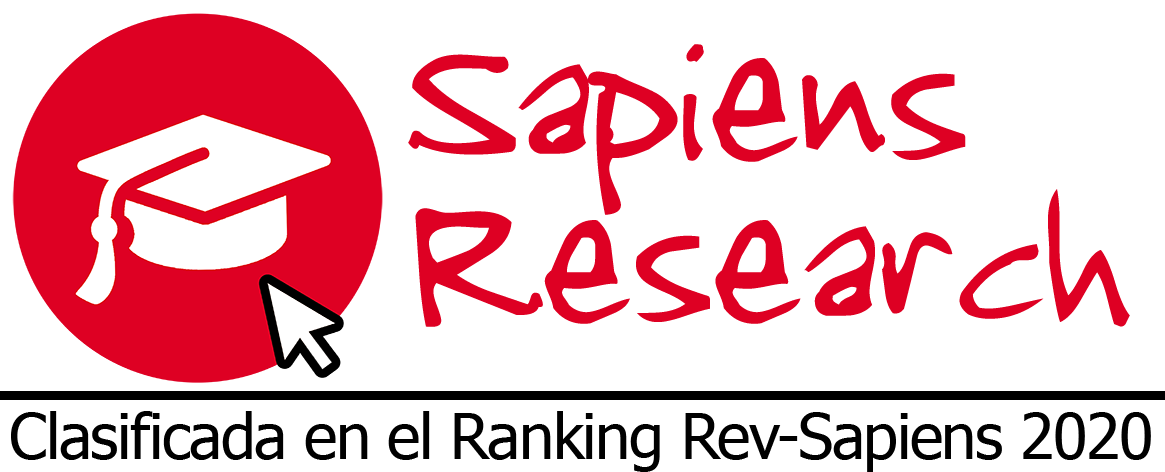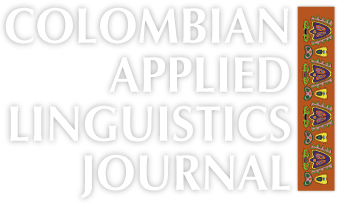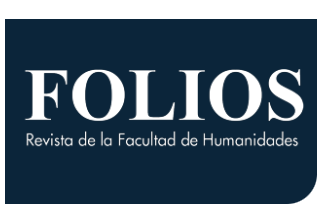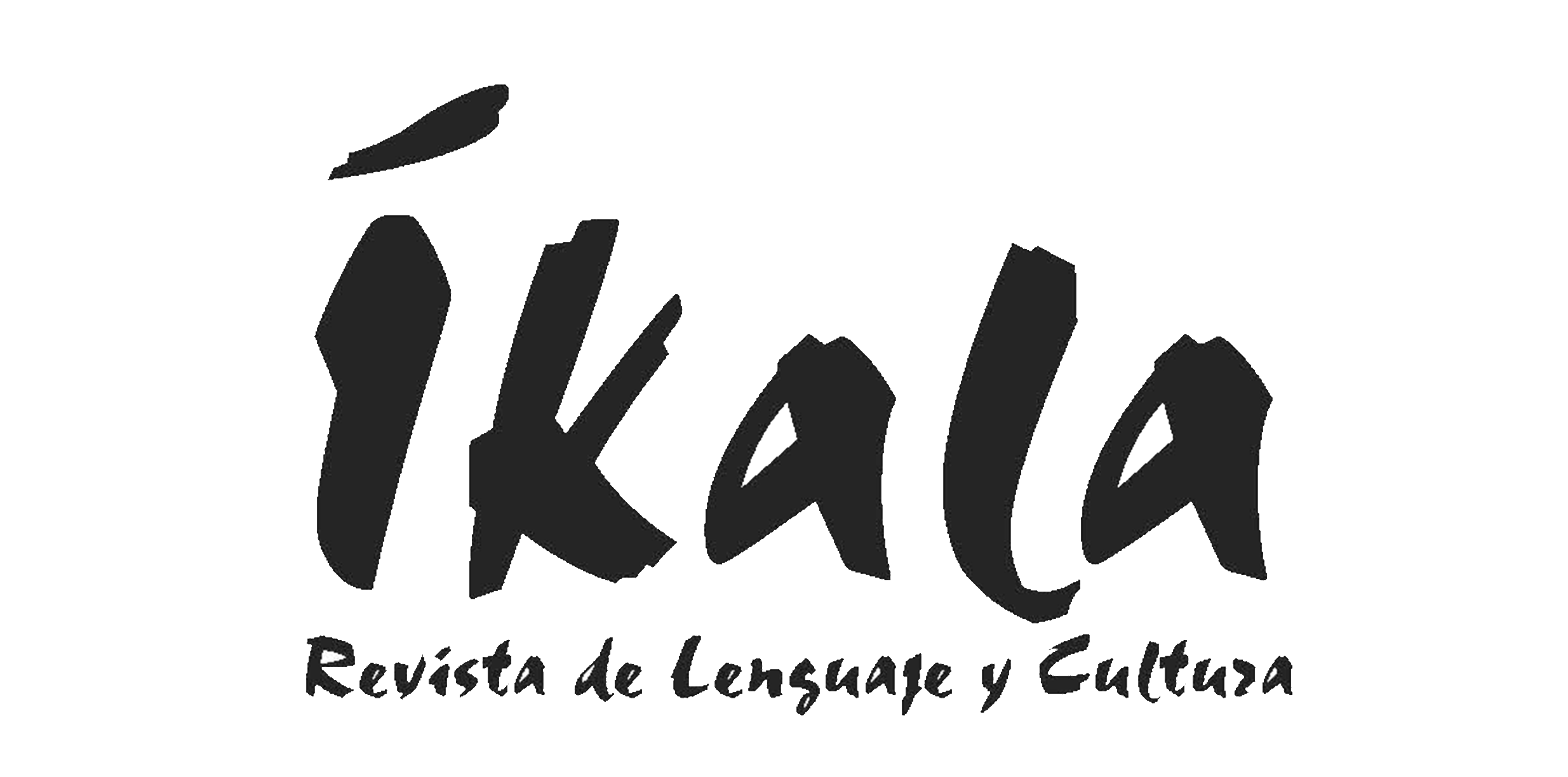Editorial
https://doi.org/10.15446/profile.v18n1.53928
Editorial
How to cite this article (APA 6th ed.):
Nieto Cruz, M. C., & Cárdenas, M. L. (2016). Editorial. PROFILE Issues in Teachers' Professional Development, 18(1), 15-18. https://doi.org/10.15446/profile.v18n1.53928.
This is an Open Access article distributed under the terms of the Creative Commons license Attribution-NonCommercial-NoDerivatives 4.0 International License. Consultation is possible at http://creativecommons.org/licenses/by-nc-nd/4.0/.
We are a community. We are an identifiable group, whose members are interested in interaction with one another for the sake of learning, and also for the enjoyment of exchanging experiences and ideas with sympathetic colleagues. (p. 388)1
As human beings we are bound to be part of and live within a community. Our first community, our family, surrounded and provided us with all the necessary tools to be able to join other communities along our childhood, adolescence, and early years of adulthood, namely the elementary, high school, and university as well as our circles of friends and acquaintances.
When we decided to become teachers by conviction, chance, or destiny, we knew that our development and evolution would occur within groups of students and colleagues in academic and administrative positions. Our community does not drastically differ from others: we act, interact, exchange, share, and even compete with its members. What makes us different is the love for learning, for feeding our brain and heart with the joy of having contributed one way or another to the progress of a pupil, a school, a region, a country and why not, the world itself.
Our teaching and learning communities give us food for thought in the form of problems to solve, challenges to face, paths to follow, truths to unveil, realities to face, and a myriad of ventures difficult to ignore. The odds are that we may take the risk to do things in search of excellence. One way of doing so is via research. As acknowledged in academic circles, research opens up an excellent opportunity to problematize our daily practice. Our personal experience can be enlightened by the interchange of ideas with colleagues from similar or different worlds. We may benefit from the knowledge produced elsewhere but applicable in our unique circumstances. Likewise, we can contribute to the profession by reaching our peers through forums such as academic journals.
We are very aware of the big or small changes occurring in the very heart of the educational system: the community itself. The most hidden or forgotten corners of a classroom or an institution could be transformed by the action of a teacher who has faced his/her established ideas and has provoked a whole transformation visible in fresh ideas, attitudes, and positions. We seek and find the teachers who take a step forward and work harder in order to make their work visible through publications. Not only are these contributors mediators of knowledge, but they are also real agents of change because of their willingness to expound upon their critical views on the many different situations occurring within their own communities.
We have gathered eight articles in the first section Issues From Teacher Researchers. We begin with the work carried out by Colombian schoolteacher Paula Andrea Caicedo Triviño while taking part in the teacher development programme led by the PROFILE Research Group at Universidad Nacional de Colombia over the last two years. In this first article we can read about the action research and innovation project she conducted with high school students in a public school in Bogotá in order to examine their written performance in English classes while engaged in cooperative lessons.
Next, we present four articles dealing with teacher education. The first one, by Colombian authors Angela Yicely Castro Garcés and Liliana Martínez Granada, deals with the role that the collaborative planning, implementation, and evaluation of classroom projects, developed through collaborative action research, played in the professional development of in-service and pre-service teachers. Following that one we can read a contribution from Turkey. This time, Sumru Akcan shares with us the results of an investigation with novice non-native English teachers with the purpose of unveiling their opinions about the effectiveness of their teacher education programme and the challenges during their initial years of teaching. Interestingly, the results show substantial differences between the content of novice teachers’ academic courses in their teacher education programme and the conditions they found in classrooms.
After that, Colombian authors Orlando Chaves and Maria Eugenia Guapacha inform us about a study that followed a mixed-method. The investigation took place in Cali (Colombia) and was carried out within the premises of a professional development programme aimed at improving the practices of public English teachers through a practice-reflection-theory cycle. We can get acquainted with an eclectic approach tailored to the participants’ needs and interests which let both teachers and teacher educators attain said goal.
The last article of this group of works in the field of teacher education comes from Jorge Eduardo Pineda Hoyos and Luis Hernando Tamayo Cano. They report on the implementation of a teacher’s professional development strategy that sought to foster e-moderator competencies among language faculty at a Colombian public university and to examine the extent to which they understand the concepts of e-moderation and e-tivities. The results shed light on online processes, technical skills, and teachers’ personal characteristics that might be necessary in order to become e-moderators.
The following three articles focus on academic writing and oral communication. The first one, by Troy Crawford, Irasema Mora Pablo, and M. Martha Lengeling addresses, through narrative research methodology, the different factors that appear to affect the on-going construction of second language authorial identity in a professional academic environment in Mexico. We can learn about the struggles of two university professors to maintain their professional status in second language writing, a situation that is also present in many other countries, where the pressure to publish poses great challenges to scholars.
Then, José Vicente Abad and Paula Andrea Alzate tell us about the results of a study that involved two teacher-researchers at different Colombian universities in order to train students—in their English courses—in the use of language learning strategies and to then assess the impact of strategies instruction on students’ preparation for and performance on oral exams. Finally, we can find the work by Jose David Herazo Rivera and Anamaría Sagre Barboza, concerning the co-construction of participation through oral mediation in the English classroom. Their study sought to look at how a Colombian second language teacher mediated her ninth-grade students’ participation during classroom interaction. The findings let us understand how such mediation provided learners with frequent affordances to engage in meaning-making.
Issues From Novice Teacher Researchers, the second section of our journal, brings this time a report derived from an action research project conducted by Juan Sebastián Basallo Gómez with adult learners in a Colombian language institute. As can be read in his account, the students’ text selection processes, guided by systematically designed criteria and elaborated strategies, influenced learning and literacy. This is evidenced in the students’ motivation and opinions concerning reading in English.
The last section, Issues Based on Reflections and Innovations, contains three interesting works in the area of language teacher education. First, we can read a critical account of foreign language education policy in Colombia, with particular attention paid to English. In their article, Camilo Andrés Bonilla Carvajal and Isabel Tejada-Sánchez analyse the impact of its multiple transitions over the past decades, some critical reception by scholars, and the actions that are being implemented with the purpose of fostering bilingualism in the country. I am sure their work will add to the debates raised by other scholars in regard to the suitability of linguistic policies in light of the diverse social, economic, and educational contexts teachers encounter to implement what is mandated by the National Ministry of Education.
Following that article Ana María Sierra Piedrahita discusses the contributions of a social justice language teacher education perspective to professional development programmes in Colombia on the basis of the examination of some local programmes for teachers of English in public schools in one city in the country. The article depicts what the implementation of such perspective requires, illustrates how it may look in practice, and gathers some implications for different stakeholders should they be interested in contributing to the development of a political perspective in teachers.
We close this edition with a contribution from Brazilian authors Telma Gimenez, Aparecida de Jesus Ferreira, Rosângela Aparecida Alves Basso, and Roberta Carvalho Cruvinel. These postgraduate foreign language researchers are developing studies regarding the current educational situation in their country and share with us some preliminary remarks regarding policies for English language teacher education nowadays. The analysis of four programmes/policies embraces their innovative aspects vis-a-vis traditional practices and some conditions still needed to ensure advances in areas such as the curriculum and predominant ideologies.
As always, we hope our journal reaches a wide range of educators. We also hope the communities of our readers can benefit from the contributions of authors from Brazil, Colombia, Mexico, the United States, and Turkey. We acknowledge the rigor of their works and look forward to more manuscripts in the areas they have addressed in their articles as well as in others that are embraced in the mission of our publication.
María Claudia Nieto Cruz
Journal Director
Melba Libia Cárdenas
Journal Editor
1Ur, P. (2002). The English teacher as professional. In J. C. Richards & W. A. Renandya (Eds.), Methodology in language teaching: An anthology of current practice (pp. 388-392). Cambridge, UK: Cambridge University Press.
References
Ur, P. (2002). The English teacher as professional. In J. C. Richards & W. A. Renandya (Eds.), Methodology in language teaching: An anthology of current practice (pp. 388-392). Cambridge, UK: Cambridge University Press.
How to Cite
APA
ACM
ACS
ABNT
Chicago
Harvard
IEEE
MLA
Turabian
Vancouver
Download Citation
License
Copyright (c) 2016 PROFILE Issues in Teachers' Professional Development

This work is licensed under a Creative Commons Attribution-NonCommercial-NoDerivatives 4.0 International License.
You are authorized to copy and redistribute the material in any medium or format as long as you give appropriate credit to the authors of the articles and to Profile: Issues in Teachers' Professional Development as original source of publication. The use of the material for commercial purposes is not allowed. If you remix, transform, or build upon the material, you may not distribute the modified material.
Authors retain the intellectual property of their manuscripts with the following restriction: first publication is granted to Profile: Issues in Teachers' Professional Development.



